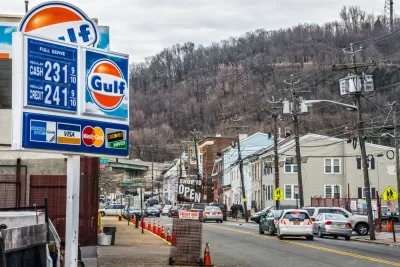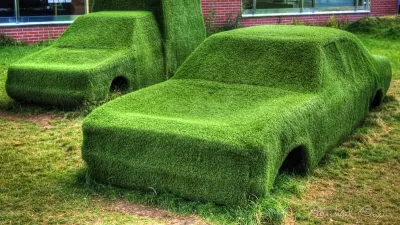Several cities located in the Northeast, especially in the New York region, saw a significant increase in the number of car-free households.

Although car ownership is increasing as the economy improves following the Great Recession (that is, fewer American households are car-free), there are exceptions to that trend to be found in a surprising kind of place—the country's medium-sized cities.
"Several mid-sized cities recorded notable increases in shares of car-free households when averages from the 2015 and 2016 American Community Surveys are compared with those for 2009 and 2010," according to an article by Mike Maciag.
The list of medium-sized cities with an increasing number of car-free households include:
- Paterson, New Jersey
- New Haven, Connecticut
- Davenport, Iowa
- Elizabeth, New Jersey
- Peoria, Illinois
The article includes additional data about car-free households, along with some helpful infographics to presenting the trends in visual form.
FULL STORY: America Still Loves Cars, But Some Cities Are Starting to Ditch Them

Maui's Vacation Rental Debate Turns Ugly
Verbal attacks, misinformation campaigns and fistfights plague a high-stakes debate to convert thousands of vacation rentals into long-term housing.

Planetizen Federal Action Tracker
A weekly monitor of how Trump’s orders and actions are impacting planners and planning in America.

In Urban Planning, AI Prompting Could be the New Design Thinking
Creativity has long been key to great urban design. What if we see AI as our new creative partner?

San Francisco Mayor Backtracks on Homelessness Goal
Mayor Dan Lurie ran on a promise to build 1,500 additional shelter beds in the city, complete with supportive services. Now, his office says they are “shifting strategy” to focus on prevention and mental health treatment.

How Trump's HUD Budget Proposal Would Harm Homelessness Response
Experts say the change to the HUD budget would make it more difficult to identify people who are homeless and connect them with services, and to prevent homelessness.

The Vast Potential of the Right-of-Way
One writer argues that the space between two building faces is the most important element of the built environment.
Urban Design for Planners 1: Software Tools
This six-course series explores essential urban design concepts using open source software and equips planners with the tools they need to participate fully in the urban design process.
Planning for Universal Design
Learn the tools for implementing Universal Design in planning regulations.
Gallatin County Department of Planning & Community Development
Heyer Gruel & Associates PA
JM Goldson LLC
Mpact (founded as Rail~Volution)
City of Camden Redevelopment Agency
City of Astoria
Jefferson Parish Government
Camden Redevelopment Agency
City of Claremont




























